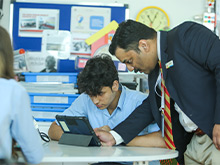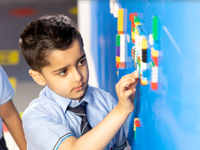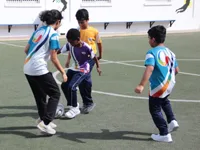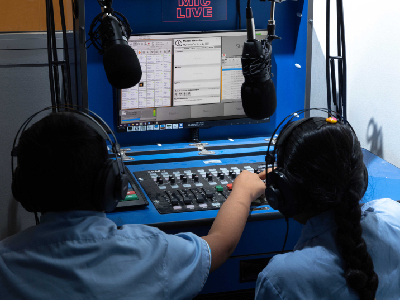Research has made it evident that active engagement with students in the learning process increases their attention span and interest, it encourages them to practice higher-order critical thinking skills, and encourages meaningful learning experiences. Increased student engagement helps in better learning experiences.
When a greater number of students participate in class discussions, there is more bonding in the class, learning becomes more fun and obviously more ideas are discussed.
Professors who embrace this student-centered approach in learning increase opportunities for student engagement, which in turn helps everyone more successfully attain the course learning objectives.The end results, a more involved classroom, who is eager for the next session.
Following are a few steps you can adopt to make learning more fun and interactive in class: These steps are adopted mainly by top International Schools in Dubai.
There are plenty of things the school can do to improve the engagement with the students. Let’s have a look at them:
1. Introducing an active learning environment
The classrooms in these schools are arranged in a particular way so that it allows all the students to participate in class activities and discussions as much as possible. In an online set up, the lessons are taught in such a way that they grab the attention of the students.
When the teachers conduct an interactive lecture the students often don’t zone out or aren’t distracted and bored easily; instead they actively participate in class by asking questions, indulging in debates, discussing current examples, and concepts related to the real world. This obviously improves the student-teacher relationship and creates a friendly environment among the classmates.
2. Discuss your expectations with the class
Letting your class know about what you expect from the students is a great way to encourage them to participate in your class. This can be a great ice breaker on the first day of school, where you can discuss each other’s expectations for that particular semester/year. When the expectations from both the teacher and students are clear it is beneficial for the school, the teachers as well as the students and their parents.
Letting the students know about the teachers’ expectations prior to the semester can help the students set their goals and prepare for the lessons accordingly. As for teachers, it can help them cater to the specific needs of the students and adjust their mindset accordingly.
3. Knowing your students well
To seek students’ hundred percent attention, it is necessary that the teachers understand their students well. The students enjoy the classes more when they receive individual attention from the teachers. When the teachers recognise their students as an individual, students take more interest in class interactions and stay active throughout the class. This avoids deindividuation and builds a good student teacher rapport.
The teachers should make it a point to know each student’s name so that they can interact with the students while teaching.
This personal attention helps the students to improve their attention span hence keeping them on their toes in the class. The teachers can also give constructive criticism to the students so that they can learn more effectively and eventually enrich the students’ mindsets and knowledge.
4. Giving every student equal chance
The teachers need to make sure that every student in the class is attentive and active. Sometimes, few students dominate the class discussions; this leads other students to zone out. To prevent this, the teachers should be observant to pinpoint the passive students and make sure that they are involved in the class discussions.
Sometimes, the students may know the answers but don’t prefer engaging with the class due to low confidence. The teachers can encourage the students to participate in class and boost their confidence.

5. Delegation of responsibilities as a class
To increase engagement in class, the students should be made responsible towards various activities. For example, the students should be encouraged to ask questions and initiate discussions or debates, along with this the class should be made responsible to critique or discuss the idea of the student.
They should also be made responsible to maintain discipline in class, by maintaining silence when the teacher is not in class, or refraining from giving chorus answers. Instead, students should be encouraged to raise their hand if they want to communicate with the class.
When students are determined to be good, they will more likely accept these guidelines without hesitation right from the beginning.
6. Listening and maintaining eye contact
Teachers need to understand that when conducting an interactive session it is very important to maintain eye contact and listen to the student patiently. Maintaining eye contact assures the student that they are being heard. There may be misunderstandings among students if you interrupt them unnecessarily.
The teachers should make sure that the students fully voice out their opinions and thoughts and teachers can then explain further once the students are done expressing themselves.
7. Request for Suggestions
Research has demonstrated that students don’t appreciate when their ideas or answers are rejected and hence they are called out in front of the whole class. This tends to make the students shy and introverted therefore they are less likely to participate in class discussions in future, instead teachers should ask the students to submit anonymous suggestions.
The teacher can either read out all the feedback in the class or decide to implement only certain feedback which may benefit the whole class.
These suggestions help the teachers to understand certain problems that they may have not recognised earlier. These suggestions can help the teachers change their teaching method if necessary.
The feedback may also point out certain teaching patterns that the students may have really enjoyed. These feedback are great eye openers to the students as well as the teachers and will encourage open discussions in class.
8. Appropriate changes in Teaching Methods
One of the prime reasons why students lose interest during class is repetitive teaching styles and methodology. Therefore at most leading schools in Dubai, regular training seminars and sessions are held for the teachers so that they can learn about the new teaching methods which will in turn help them to conduct classes more efficiently and help increase the students’ attention span and interest.
Experimenting new teaching methods combined with students’ anonymous feedback can help teachers gain insights on the teaching patterns and the students can benefit from the new teaching methods. Experimenting with teaching methods builds curiosity in the students and therefore prevents them from boredom. New methods create interests in the students, excite them and keep them active in class.
Also Read: What is Taught in International Schools?
9. Being open to students doubts and setting a dedicated time to solve/answer them
When learning every student develops curiosity and as a result they have many unanswered questions in mind. The teachers should encourage the students to ask as many questions as possible. The teachers should also ensure that they get back to the students with correct and reasonable answers. When the students ask questions during the lectures it gives a platform for discussions.
The teacher should make sure every student asks their doubts and every doubt has been solved. The teachers usually ask her students to look for solutions to the problem and give them enough time to come up with a good answer. Later the teacher should add to the students’ answers or correct them appropriately.
Conclusion
Schools in Dubai have realised that active participation in class is very important for the students’ cognitive growth. Although it doesn’t take place overnight, the teachers make sure that every student eventually takes part in active class discussions. Above were a few methods used by schools in Dubai for the growth of their students.
























